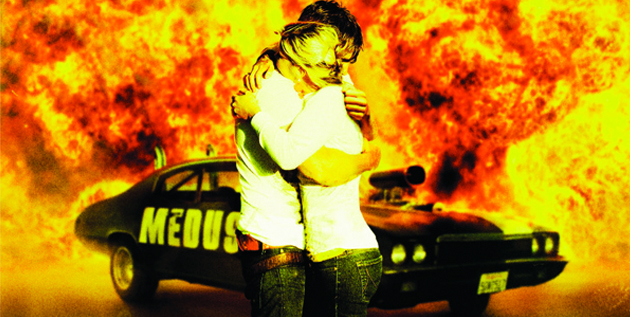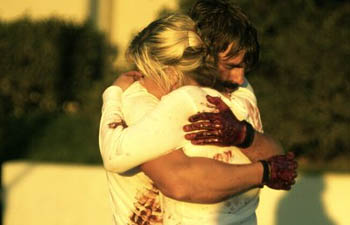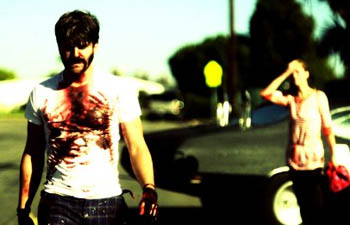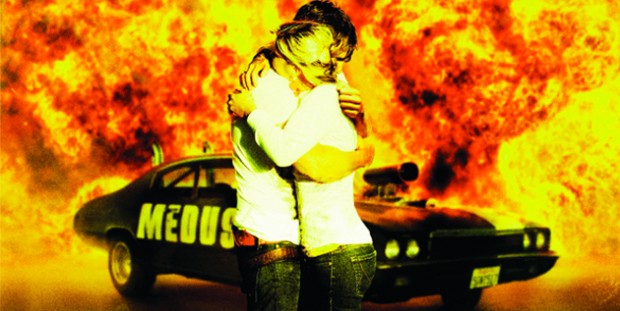
A few weeks ago, I was able to sit down with Bellflower do-it-all Evan Glodell, surrounded by tons of Beastie Boys paraphernalia at Oscilloscope’s New York offices. Evan had a genuine smile plastered on his face throughout a lighthearted conversation on his half-lighthearted film. We discussed his love of tinkering,walking through suburbia with a flame thrower, the stunts he looked forward to pulling off the most, and what it feels like to use Medusa, the apocalypse-ready muscle car featured in the film, as his every day drive around.
TFS: How long has Bellflower been knocking around in your head?
EG: Oh, wow. Well I wrote the first draft of the script right away, pretty much, when I got the idea. But from the time that I had the first version of the script until we were shooting was like…five, six years, something like that. Pretty much the whole time I was struggling to find a way to make it happen.
Did this happen before you started to do the web series shoots [for STIM TV]?
No, that was in the middle. That was work stuff I was doing, a company I was making little IDs and commercials for. They had the idea to have this web series but we didn’t get very far with it.
 I noticed a lot of people that you worked with from that project are in this film. Did you think of the characters first, or did the actors sort of inform them as you went along?
I noticed a lot of people that you worked with from that project are in this film. Did you think of the characters first, or did the actors sort of inform them as you went along?
The characters were definitely set beforehand. They had a very strong influence from various real people. But as each character was cast, as time went on…like Tyler [Dawson, playing “Aiden”], for example, his character is really heavily based on my best friend in real life, my childhood best friend. So it started out like that, as [just my childhood friend], and then as Tyler was around more and more and I became super close friends with Tyler for years and years by the time we started shooting, obviously the character started to change and started to blur in my head. So as I was doing re-writes, I was like, “wait, is this Tyler…or is this Aaron [his real-life friend]?” I’m sure everyone had their kind of roles in that.
The thing I really enjoyed in the entire process, especially the opening, was how naturalistic everything was. It felt like there wasn’t a script, it felt very off the cuff–
–A lot of people have been saying that.
Is that just because of wonderful actors and you guys being so close together?
I think all the actors are wonderful. It’s probably just more of a style thing, the way that we would set the tone for our scenes and the way that we shoot, that people are reading like we’re ad-libbing.
Were there a lot of rehearsals for this?
Not a lot of rehearsals. I think we did a rehearsal time, but Me, Jessie [Wiseman, playing “Milly”], and Tyler have been talking about this movie for years and years. They’ve had the scripts, they’ve read’em, we’ve talked about the characters, how we want [the movie] to be, and this and that. Right before we started shooting we had a couple rehearsal things where we’d go through all the scenes and rehearse them and then [on] the days of, obviously….
It’s kept pretty loose. I try to, I dunno. Cause you change it, depending on the mood on a certain day, it might not play out the way it would on a different day.
It feels that way. It feels very loose and…homey. Especially when the movie sort of goes off the rails later on. I cared so much about these characters from the open, to see them go through what they go through is…really hard to watch.
(laughs) Yeah, it sucks!
It’s almost good to see you now as you are as opposed to the image I left the movie with.
Oh, yeah, I was in rough shape at the end of that.
From what I read, the budget couldn’t have been that high.
I can’t remember if they told me if I should tell people or not….the budget was basically zero. There were eleven of us, all friends, working on this. I had a couple thousand dollars that we started with that I saved up, and that ran out in, like, a week. Then everybody kind of put in [money] to try and keep it going any way they could. We tried to come up with a number. It’s a guess, sort of, but roughly how much we spent to [make] the version that got into Sundance, which is very similar to the one that is coming out, was $17,000.
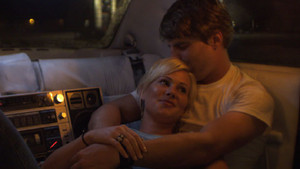 Was there any real change from the Sundance screening to the print at the press screening I saw recently?
Was there any real change from the Sundance screening to the print at the press screening I saw recently?
Nothing significant. A sound mix, I guess?
Well it sounded fantastic.
Ha, good, good.
How much went into Medusa or the flame thrower? How much does a flame thrower cost?
Flame thrower is not too much money. A couple hundred dollars, probably, to build it. It’s super funny cause as you were in here, we were just in the other room trying to figure it out because the Medusa car is awesome, but it’s also cursed. It’s impossible to maintain. Muscle cars and drag cars and race cars in general are a very expensive hobby, because any time you start putting too much power in a car, if you drive it hard, it stresses everything in it, and shit breaks all the time. But it’s funny because it’s broken right now and we need it in three days, so we were just trying to figure out how we, in a cost effective way, can get it running again.
And where is it currently?
It’s just outside of my house in Ventura.
So people can just walk by after they see the movie, look at it, take some photos.
Right now it’s my only car.
Really?
I don’t have another car so I drive it–when it is driving good, which actually has been most of the time lately–I drive it around. Last week, someone followed me to my house. Isn’t that weird? I didn’t notice they were following me so I pulled in front of my house and I had some bags and some groceries. So I’m in the car, turn it off, take all my stuff. I’m in no hurry, cause no one’s waiting for me. So I get out of the car and turn around, lock the door, close it and then all of a sudden I turn around [the other way] and there are just people, sitting there in a car, idling in the middle of the street. They’re like, “I saw that car in a movie trailer.” I was like, “Yes! It’s coming out in a movie!” The movie was made in Ventura but they hadn’t seen it [while shooting] which totally tripped me out.
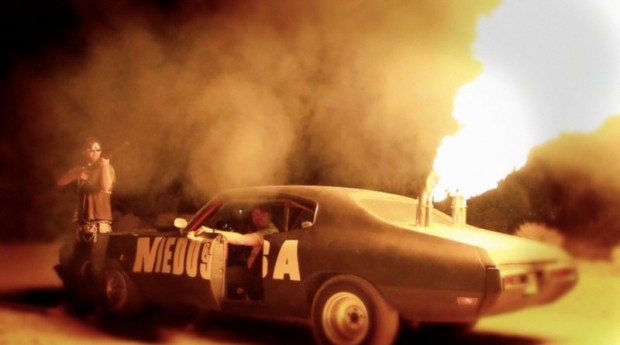 Well, one would think with the flamethrowers going and the other stuff going on with the car…. Was the car driven–that one shot of Medusa of that nice, slow-mo, burn-out scene–was that just shot, like, in suburbia?
Well, one would think with the flamethrowers going and the other stuff going on with the car…. Was the car driven–that one shot of Medusa of that nice, slow-mo, burn-out scene–was that just shot, like, in suburbia?
That’s a section of downtown Ventura, actually. It’s this cool little neighborhood. But no, no we just went down there and did it.
How many takes did you get walking around with the flamethrower through wonderful Ventura?
How many did we do? We did quite a few, actually. We were a little bit worried. That was one of those things that was so sketchy. I have a working flamethrower on, which is definitely not legal, right? And we’re not shooting it on the street. The pilot’s lit and I’m walking around so we shot takes of that for a whole evening. From the time right before the sun went down until it was totally dark. So we did, like, seven takes or something? And nothing happened. But it’s one of those things where if a cop did decide to bug us, he would have had the option to be like, “oh, I’ll let this go” or throw us in prison.
There’s a lot of great engineering in this film, specifically with the objects in it and the lens…?
Yeah, the three weird…the one, sort of, camera and the other two optical systems.
Were those built specifically for this film or did you just want to see how they’d work?
Two out of…no, pretty much all of them were built for this movie. It’s just a hobby that I have. I play with optics and I build stuff, so I’ve been planning for a while a couple of specific versions for this movie. There were two that were just supposed to give a certain look that were kind of the main cameras for the whole movie, and there was one really special large-format camera that was unique, and used for just a couple of shots.
Was that the one used at the open in the bar? I noticed that when we meet all the characters the focus was very interesting, because only one aspect of the focus was in and everything else was blurred.
Oh yeah, yeah…. no, the really special one we built was only used for one shot where I’m covered in blood and walking at the end of the movie in one long steady-cam shot.
Yes! The happy shot at the end of the movie.
Has that engineering aspect always been a part of your film making?
Yeah, I think always. I think it ties heavily into film, especially low-budget film making. Really anything where you want to have a lot of control over aesthetics or stuff. I’ve always built stuff all the way down to where if you want a certain shot, you sometimes have to build a special rig to get a shot. And building props, if you have special props like this movie had. The cameras, that was a hobby I got into almost ten years ago and is something I always do now.
It seemed like you were building Medusa during the shoot. Was that stressful in any way?
That sucked. To build that car alone, it could have been like–and it actually did end up being–almost a blessing that the car broke down during our main shoot and that we weren’t able to finish shooting with it until a year later. The main shoot [in] the summer of 2008 for 90 days, we shot almost everything, but there were some things, like some of the fantasy sequences, we couldn’t afford to get out to the desert with everybody. And the car broke down and we couldn’t afford to replace the engine that blew up, blew up.
So as I was editing, every so often, pretty much nonstop for two-and-a-half years, we were just out shooting more stuff and working with the car. While we were shooting [originally], we’d be staying up all night making the car transform through those sections. Once it broke down, I got the time to work on it really to where I wanted it to be by the time we finished shooting. If you really look, there are about twenty different versions of the car in the movie. Even just the dashboard, if you look at the different variations of how many switches and gauges are there.
You wrote it, you directed it, and you were in it a good amount. How was that process, juggling it on set and later editing?
It was very stressful. The acting part was the most stressful for me because I don’t particularly have ambitions as an actor or anything.
So that just sort of happened?
No, there was a decision that was made at one point. I was thinking about it and I don’t think anybody had come along that I get excited about playing the lead role. Also, I knew that I intuitively understood the part–even on levels that I probably didn’t even realize I understood it on–so I thought it would there would be a benefit because it was such a personal story; playing the part even though I was terrified. And every time I was in front of the camera it made my day much worse because it was so stressful.
In editing, that’s one of those times where you have to trust other people. For my takes, I would pick the ones that I thought were my best takes and a lot of times my friends would be like, “that is not the best take. This one, I think, is way better.” Because I was thinking that I was going for this [specific performance], so I’d see the one like that and think that I did it but they were seeing it and being like, “that one looks totally forced because, obviously, that’s the one you did just the way you thought it would be and this is the one where you’re actually in it.”
Would you like to continue acting in your movies?
I really, really, hope I don’t ever have to act in one of my own movies again.
Yeah, just because it was too difficult. But who knows what will happen? I’m hoping that I find all sorts of wonderful people to cast–including the leads–in the next project who aren’t me.
I read that there was a possibility of taking this story further, that there would be more “Stories From The Apocalypse”?
No, but that’s super funny. I keep getting asked that today. There’s this group of scripts that I’m writing, five scripts, and I’d given them the jokey name “Tales From The Apocalypse.” It’s not really a very accurate description. I didn’t realize how much the world “apocalypse” was going to…it’s a little part of it, in Bellflower, but it gets talked about so much. I didn’t realize how much it would get talked about. Bellflower is not a part of that group of scripts. So, yes and no.
Tonally, there’s a drastic shift halfway through this film. Was that always part of the process?
Yes, that was one of the original ideas as it first came in was there was going to be this super long [section] of character development and getting to know all of the characters and set up the story–focusing on the good part of the relationship, the beginning of it all–and then it was going to suddenly switch in the middle and become the exact opposite. [We spent] a lot of time and stress trying to figure out if people were going to go with it or if they were just going to get knocked out of the movie.
It was a nice, slow fade into it. All of a sudden there’s a point towards the end where [a violent act occurs] and all of a sudden I’m like, “OK, I don’t know how I got here.”
Yeah, all of a sudden the characters start to brutalize each other (laughs).
As an actor, was it more fun for you to be the lighthearted, fun Woodrow or the darker, edgier version?
The darker stuff, definitely. The harder stuff for me is the simple stuff, just trying to be natural and just be the character and be like, “Hi, how’s it going?” That’s hard. The really emotional stuff, that was much harder work and more stressful, but it’s more to focus on, for me.
Do you think Woodrow feels more at home in the “Lord Humongous” realm or is he more of the guy that we meet at the beginning? He always feels at home in both worlds.
(laughs) Yeah! I think it just depends on the day, the situation.
Do you think the character always had that inside of him? Because he seems like a very nice, adjusted guy but then again the “meet cute” is him eating bugs, so….
Well everybody’s got a little “Lord Humongous” inside of them (laughs), I think.
Is your next project…well, you have five scripts, so it’s a little bit more varied, but is the tone switch something that you’re going to continue to go for?
I don’t know if I’d actually be pushing that particular element. I was noticing at some point that a lot of the scripts I’m working on, like the one I’m going to be doing next, I was noticing some similarities. The themes are totally different but stylistically I think people would recognize them as being very similar.
There was so much comedy in the front that was very disarming. Do you enjoy writing comedy more so than drama?
Yeah, I think in my own time, as far as little projects I’ve done before, like short films and playing around with stuff. It always bounces between those two things. I’m either making things that are really serious and dark or just making total comedies.
So this is really the melding of those two different esthetics.
Those are two things that will probably always be in my projects, the comedy and the serious, extremeness…or whatever you want to call the other stuff.
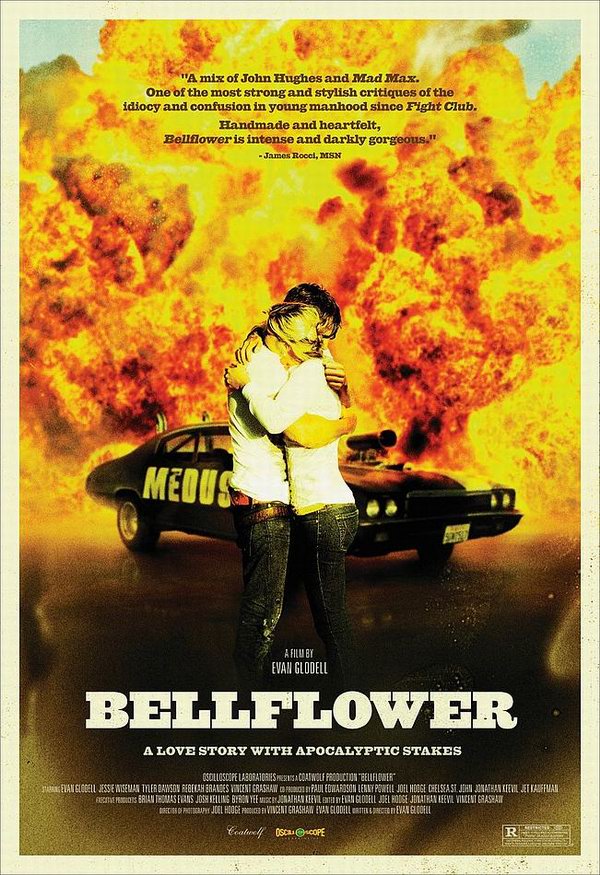 As someone who’s seen this and sort of felt very bad for your character and the rest of the guys (laughter) the ending feels ambiguous, but I’m not sure if I misread it. I think my take is just me being optimistic–
As someone who’s seen this and sort of felt very bad for your character and the rest of the guys (laughter) the ending feels ambiguous, but I’m not sure if I misread it. I think my take is just me being optimistic–
–No, no, that’s not being optimistic. This is an interesting and it’s a hard one because it almost requires a long conversation to cover this subject, because I don’t think there’s really a cut-and-dry answer. Some people are being like, “is this section an alternate reality? Is this section a fantasy and this section is real or is it some totally other thing?” And, for me, anyway, there isn’t a real hard, set answer in any one of those departments. It’s more like the movie is trying to represent something and it’s sort of an emotional storyline as opposed to factual. The plot is run by a character’s emotional arc, and so it does blur a lot of stuff like that.
And the whole thing seems like one long bender in the first place. There’s a constant amount of drinking (and other substances involved) so it seems like it couldn’t really be a reliable storytelling device.
Yeah, and obviously my character is a heartbroken, possibly brain damaged, drunk. Probably medicated as well after getting to the hospital. And you’re seeing everything through his eyes in the last part of the movie. Would you call it a mix of reality and fantasy, or something else, I don’t know.
I’ve been trying to avoid saying any hard answer about anything […] but I think that if people think about it they’ll all come to the same conclusion. If anybody cares to think about it that much and watch it again it’s like…it can be figured out, I think.
And with the motorcycle stunt, did you really take the hit?
People keep asking me that! That was one of a list of really simple special effects that we were excited about. There were certain things that were planned for years.
One of those nice cornerstones of filming as time goes on. You look forward to getting hit by a car.
(laughs) Yeah, that’s the one! We got that, and we did it, and our idea worked and we were super excited.
That was the third flamethrower that you built?
From the time I first wrote the script, the main prop was just a flamethrower. That was before the Medusa car existed in the script. I thought I was making [the movie after writing was completed], so right away I was like, “I need a flamethrower to start making it.” I thought that would be good enough for a while then when we were actually going to get it made, however many years later, the old flamethrower wasn’t good enough. So I built another one and it was almost there [but still not good enough].
They were all in different styles, oddly. The one we almost settled on was like a rifle. It had a shoulder strap and it was all contained. Then we were looking at it and we were like, “it’s too cheesy looking. We have to go with a backpack like they do on the military ones and have a proper flamethrower.”
Looks more industrial.
Yeah. Backpacks with cool things on ’em are always awesome, like Ghostbusters (laughs).
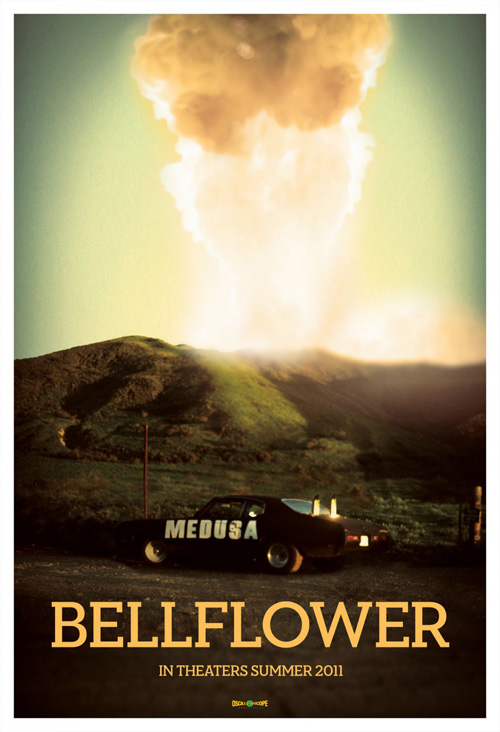 Where did you shoot that final dusk scene when the flame goes about fifty feet in the air?
Where did you shoot that final dusk scene when the flame goes about fifty feet in the air?
We measured it–I don’t know if our methods are accurate–but I measured it at a little over seventy feet. And that was by measuring [against] the two of us in the shot who are almost exactly six feet. It was a pretty good profile shot so we just counted ’em up.
And it looked beautiful. A real “beauty in chaos” situation.
Yeah, that’s one of my favorite shots in the movie, definitely. We did it in a park in Camarillo. There’s this place that had a dairy farm that all the local kids say is haunted, cause…I don’t know, something about a mental institute was out there and the mental institute workers worked on the dairy farm and something scary happened. But it’s all abandoned.
Every time we had to blow something up, we’d hike out there. We had to get all our equipment on backpacks and bags and walk for about a mile and a half.
You mentioned how Medusa wasn’t in the first part of the script. At what point did that brainstorm occur?
I can’t remember…when did that happen? I was working on one of the rewrites and I think I realized that the flamethrower wasn’t quite strong enough a thing to carry through the whole movie for what the characters were doing. I think the scene was already written where the characters were saying “we should have a flamethrower and a motorcycle and a muscle car,” cause those were all the cool objects from Mad Max. And I think it just clicked at one point. “Why did I never entertain the idea of them having a sweet apocalypse muscle car?” And then the journey began of trying to figure out what that was going to be.
Do you usually work with sweet-ass muscle cars?
No, no. I mean, I tinker with everything, so when I have cars, if they break, I’ll try to fix them and sometimes I’m successful. But from the time we got the Medusa car til now I know about a billion times more than I did. I think I had to learn how to work on cars because of the Medusa car.
Was that the same process with the first car that featured the whiskey dispenser?
It wasn’t, because that one was mostly stuff that was already in my realm. We didn’t do any engine work on that car. It was all cosmetic stuff, a couple little gadgets. But that was all stuff that was easy to figure out. The Medusa car had to be bad-ass, and fast, and dangerous. We were dealing with more powerful engines than I’ve ever had in a car. Y’know, stuff that breaks (laughs).
So what’s the next project?
I want to tell people, but I don’t have a name for it yet. I have a script that I’m going to be working on very shortly and I don’t have a good short pitch for it.
Great.
(laughs) It’s “Untitled Mystery Project.”
Bellflower opens in NY and LA Friday, August 5th and will expand throughout August and September. Check out a full list here.

